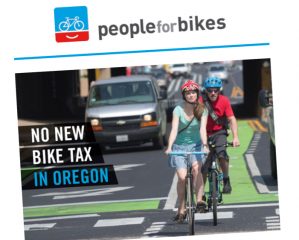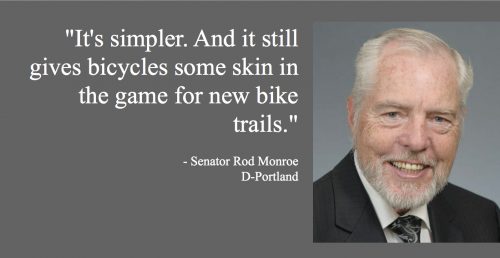Among a host of tweaks expected to Oregon’s transportation funding package is very likely to include a major change to the controversial bicycle excise tax.
Instead of 3 percent excise tax on all new bikes (with some exceptions), it’s likely to become a $15 flat fee.
In a meeting of the Joint Transportation Preservation and Modernization Committee at the capitol last night, Co-Chair Lee Beyer (D-Springfield) said he and other legislators have heard concerns about the tax from bicycle dealers. As we reported last week, the current proposal is a 3 percent tax on the purchase of new bicycles. That idea faced strong opposition from shop owners who fear the tax will drive sales toward online and big-box retailers, create onerous new reporting requirements, and put a black cloud over bicycling in Oregon.
“We didn’t want to carve out something that would hurt small businesses.”
— Senator Caddy McKeown (D-Coos Bay)
In written testimony to the committee, Metropolis Cycle Repair owner Nathan Roll said he wants the tax eliminated completely. “In a present where Americans are struggling to free themselves from the grip of congestion and obesity, we should be working to lower the bar of entry to cycling, not raise it,” he wrote. Roll also feels a bike tax, “could have a chilling effect on bike tourism” because of the many visitors whom he says purchase a new bike upon arrival in Oregon and then take it home with them afterwards.
House Bill 2017-3 (the transportation package) currently calls for the tax to be levied at the point-of-sale on all new bikes with 26-inch wheels or larger or that have a selling price of $500 and above.
In their meeting last night, Beyer said “We heard from bicycle dealers that it was problematic.” Committee Co-chair Caddy McKeown (D-Coos Bay) said “We didn’t want to carve out something that would hurt small businesses.”
The new idea is to have a $15 flat fee on all bicycles with 26-inch wheels and larger. There would no longer be a dollar value threshold for the tax. Senator Beyer said the flat tax is estimated to raise a similar amount to the 3 percent proposal, about $1.2 million per year. Money raised from the tax would go into the Connect Oregon grant program. That State Lottery-funded program is used specifically to build projects outside the highway right-of-way (like marine, air, port and bike/ped) that are constitutionally prohibited from receiving funding from the State Highway Trust Fund. Bicycling and walking projects (as per the bill) will receive 7 percent of those funds which equates to about $5 million at its current level of about $70 million.
Advertisement
There wasn’t much discussion about the changes to the bike tax at the committee meeting last night. Senator Rod Monroe (D-Portland) said he supports the flat fee. “It’s simpler,” he said, “And it still gives bicycles some skin in the game for new bike trails.”
“While our organization does not support the proposed sales tax on bicycles we know that people need more safe places to walk and ride bikes. We prefer the Oregon Legislature raise revenue for more trails from a broad base, including all trail users and industries that benefit from trails.”
— Gerik Kransky, The Street Trust
The Street Trust has lobbied to remove the bike tax from the bill altogether; but they have stopped short of threatening to pull their support of the bill on this issue. In a blog post yesterday, their Executive Director Stephanie Noll wrote that, while the group is opposed to a bike tax, they could support a “balanced” package that includes more money for the Safe Routes to School program, transit, and road safety. Noll said her organization would only support a bill that included a bike tax if it met a list of conditions — including a reduction to 1 percent, an upper limit of $100 per bike, and others.
In testimony to the committee The Street Trust’s Policy Director Gerik Kransky said, “While our organization does not support the proposed sales tax on bicycles we know that people need more safe places to walk and ride bikes. We prefer the Oregon Legislature raise revenue for more trails from a broad base, including all trail users and industries that benefit from trails.”
Keep in mind that this bike tax debate has nothing to do with good policy. It’s all about politics. Because of the pervasive “bike riders need to put skin the game” argument and the fact that the bill includes numerous new and increased fees and taxes for motor vehicles, there is zero chance lawmakers would remove the tax from the bill at this point. That is, unless there was massive organized opposition from lobby groups. That opposition hasn’t happened yet. The Street Trust is aware of the politics and is not threatening to pull support for the bill over the bike tax. Instead of vociferously opposing the bike tax, The Street Trust has decided to instead put its energy into pushing for more money to fund safe routes near schools. A larger coalition of environmental-related groups (which includes The Street Trust) says the bike tax is “frustrating” but they are still supportive of the bill overall.

In the past week, Oregon’s bike tax proposal has made national headlines. People for Bikes, a nonprofit advocacy group funded by bike companies, launched an action alert urging their members and supporters to contact legislators. “While the bike industry is supportive of finding new transportation funding sources in Oregon,” they group wrote, “the proposed bike tax will harm small businesses.” The tax was also covered in Bicycle Retailer & Industry News this morning with the headline, Oregon retailers try to fend off proposed tax on new bikes.
The legislative committee hasn’t made this change official yet; but given the support from lawmakers, it seems likely to become part of the bill. Yesterday was the last of four straight days of hearings on the bill. Now a host of amendments will be ironed out over the weekend and new bill language is expected sometime next week.
Among those amendments will likely be changes to the funding plans for the Safe Routes to School program. The Street Trust has focused their energy to win more money for this program and based on last night’s committee meeting, lawmakers have responded to their pressure. I’ll post a separate story with those details once the amendments are official.
Oregon’s transportation bill looks to raise $8.2 billion over 10 years and is largely focused on highway widening projects. It’s expected to be voted on in the coming weeks.
— Jonathan Maus: (503) 706-8804, @jonathan_maus on Twitter and jonathan@bikeportland.org
BikePortland is supported by the community (that means you!). Please become a subscriber or make a donation today.


